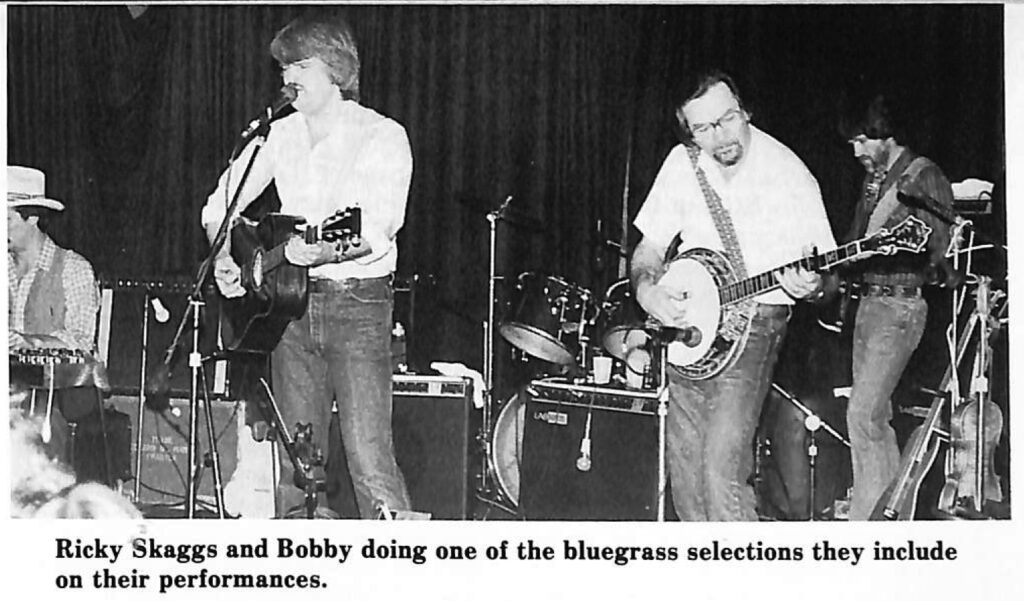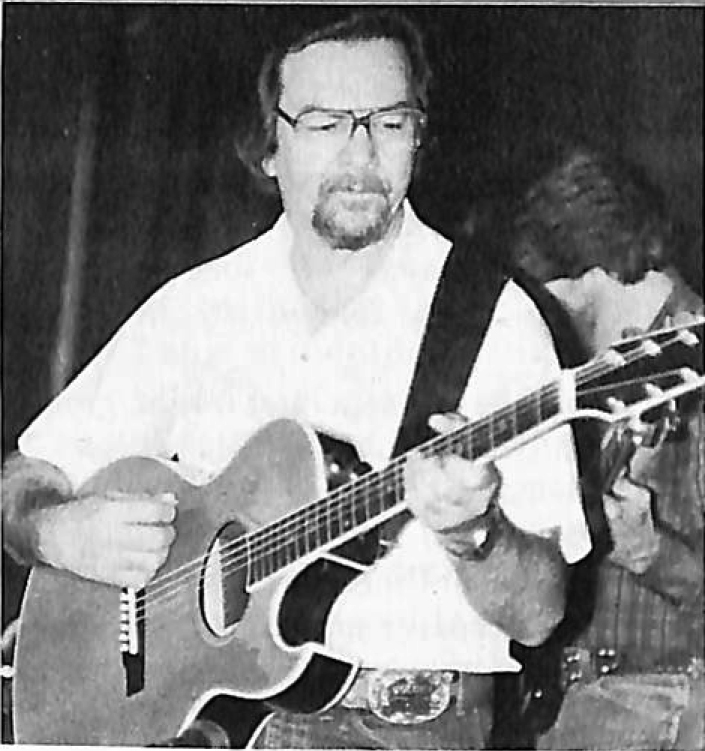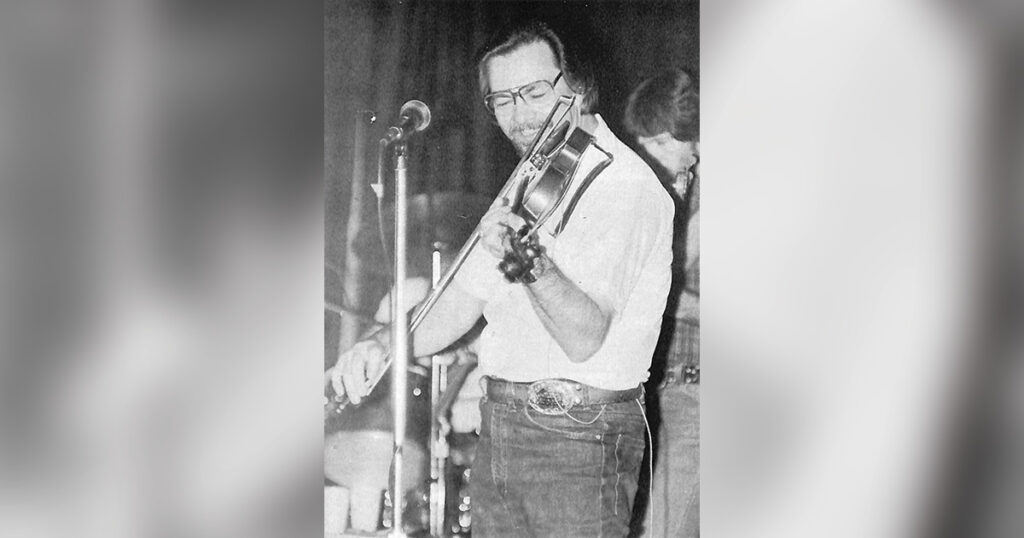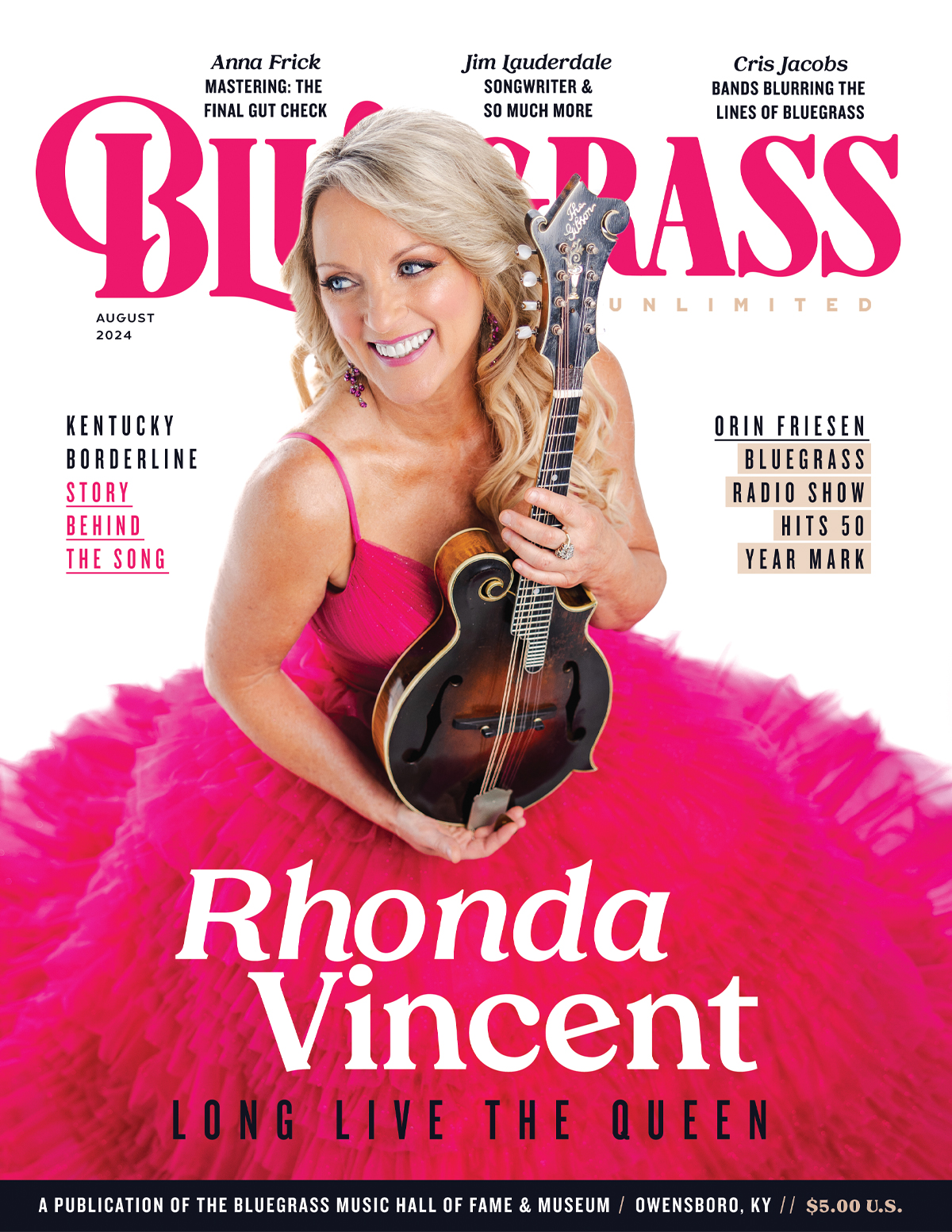Home > Articles > The Archives > Bobby Hicks—How Sweet It Is
Bobby Hicks—How Sweet It Is
Reprinted from Bluegrass Unlimited Magazine
July 1982, Volume 17, Number 1
Fiddler Bobby Hicks has a gleam of contentment in his eye these days. He’s right where he wants to be, doing what he wants to be doing, among the best of company—but he’s certainly traveled a long, winding, and sometimes treacherous road to get there.
Bobby began his professional career in the musical limelight nearly thirty years ago as a member of Bill Monroe’s Blue Grass Boys. He recorded on the original cuts of several of Monroe’s best-known instrumentals, including “Roanoke,” “Cheyenne,” “Big Mon,” and “Panhandle Country,” and spent six years as a Blue Grass Boy during the mid-late 1950s. (From time-to-time Bobby can be seen on the Classic Country series that is currently airing on PBS, playing fiddle or banjo in Monroe’s band.)
While in Nashville, young Bobby was exposed to lots of great music and got to know people like Dale Potter, one of Nashville’s top studio fiddlers at that time, whose playing had a pronounced swing flavor. Bobby credits Potter with having a major influence on his own style. “Potter was working the road with Cowboy Copas, and Bill Monroe and Cowboy Copas worked a lot of package things together. I’d get a lot of chances to be around Potter…and I learned a lot of stuff from him. I guess I was the only fiddle player that worked with Monroe that ever played Dale Potter’s stuff—like “Fiddle Patch” and that kind of stuff—on his (Monroe’s) show. That’s some of the hottest fiddle you can play!”
Things were very hard for bluegrass bands in the late ’50s, with the advent of rock and roll. Bobby was happy as a Blue Grass Boy, but he just wasn’t making enough money to survive. He left Monroe’s band and soon joined the Porter Wagoner show. The pay was not much better there, so after three years he decided to go west to “seek his fortune.” He ended up in Las Vegas, and there he met country singer Judy Lynn, who was looking for a fiddle player (to replace Buddy Spicher, who had just left the band).
Bobby accepted the job and stayed in Judy Lynn’s band for nine years, some of the most musically stimulating years of his life. He was exposed to many styles (polkas, waltzes, pop music, etc.) and forced to adapt his playing to them, and thus was constantly challenged to cross far beyond the boundaries of bluegrass fiddling. Judy Lynn recognized Bobby’s astute ear and asked him to write arrangements for the band. The work was steady and profitable for a number of years.
But while in Las Vegas, Bobby’s luck was not all good. Several times he was in near fatal auto accidents and once after a show a drunk attacked him and broke his wrists, stomping them with the heel of his boot. Bobby’s left wrist was crushed so badly that it never healed normally, and he now must set his fiddle up specially to compensate.
When the Nevada club circuit finally ran dry for Judy Lynn, she began to spend more and more time traveling long distances on the road, and this quickly got old to Bobby. He left her band and put together a group of his own, staying in Nevada until 1975, when his mother became seriously ill and he returned home to Greensboro, North Carolina to take care of her. Once there, Bobby realized how much he really liked it and decided to stay. He began getting back into the bluegrass scene and soon discovered that he had become something of a legend in bluegrass circles.
Bobby began teaching fiddle, guitar, banjo, and mandolin (he is proficient on all) lessons at the Music Barn in Greensboro, and soon had a full slate of students—sometimes as many as fifty or sixty on the roster at a time. Weekends began to fill up as various bands asked him to play festivals with them, and it was not long before Bobby was booking festivals as a top name himself. In the next several years he recorded and/or performed with most of the major bluegrass artists, including Bill Monroe (quite a reunion!), Doyle Lawson & Quicksilver (Sugar Hill-3708, 3717), The Bluegrass Cardinals (CMH-6235), The Osborne Brothers, Mac Wiseman, Don Reno, Buck White, and Ricky Skaggs (Sugar Hill-3706) (then a member of Emmylou Harris’ band).
Bobby also found time to record his first solo album, entitled “Texas Crap- shooter” (County-772). It is a showcase of the fiddle styles for which Bobby is so admired: one side is bluegrass—Monroe style—instrumentals and the other is Western swing, with the influence of Dale Potter and Johnny Gimble.

(It was from Gimble that Bobby got the idea of adding a fifth string to his fiddle. The fifth string is tuned to low C (when played it makes the fiddle sound similar to a viola) and it opens up vast new frontiers for the fiddler. According to Bobby, Johnny Gimble “had the first [five-string fiddle] that I knew about. And he’s still the master of the five-string. There no doubt about it. A lot of people have ’em, but there’s very few who know what to do with ’em. I don’t know what to do with it yet; I’m still learning something every day with it.” Anyone who’s ever heard Bobby play knows that is like Bill Monroe or Ralph Stanley saying they still don’t know how to sing.)
The “Texas Crapshooter” album is a statement of who Bobby has become through his years of playing alongside the best musicians in country music. It clearly reflects the influences of the figures who were most important to his growth, yet it steps far beyond that and establishes Bobby as a great and influential musician in his own right. Many of the tunes are familiar standards, but the styles and the sound are thoroughly Bobby Hicks.
It is this smooth, rich, deliberate, yet jazzy style which has made Bobby so popular among the stars of bluegrass and which ultimately led Ricky Skaggs to ask him to join his band last year. Ricky, achieving bluegrass notoriety in his early 20’s and spending several years as a very influential member of Emmylou Harris’ Hot Band, decided early in 1981 that it was time to try his hand in the country music world. He landed a contract with Epic, one of the major country record companies, put together a six-piece band, and organized a nationwide tour for spring and summer.
Bobby was a perfect choice for Skaggs’ band, not only because he is a super fiddler, but because of his great versatility. Being a “super picker” himself, Ricky likes to switch from one instrument to another during his show, depending on the style and feel of the particular song he is performing, and Bobby is able to do the same, to complement Ricky’s playing. When Ricky plays acoustic guitar, Bobby plays fiddle or, for the two or three bluegrass tunes they do, banjo. When Skaggs picks up his “mandocaster,” Bobby switches to an acoustic cut-away guitar with a pick-up, and when Ricky fiddles “Sally Goodin,” Bobby plays banjo. He even sings some baritone harmony on a few songs.
Of course, the fiddle is Bobby’s first love, and playing in Skaggs’ band gives him the opportunity to show off everything he’s ever learned—in bluegrass, country, and swing—and to go on learning. According to Bobby, this is a major difference between his situation now and the experience he had in Judy Lynn’s band. “I was held back a lot with Judy’s band … I didn’t get to play what I wanted to play. She would come to Nashville and record and she’d use Nashville musicians, and then she’d come back out there and have the band work up the tunes and she’d want ‘em just like the records, and she didn’t want you to play anything else.”
“But with Ricky —it’s kind of like Bob Wills said one time. I’ve got a tape of an interview with Johnny Gimble, and he said when he first went to work with him (Wills) they were playing a tune… he (Wills) pointed his bow at him (Gimble) to play and he just stepped up and played the regular old lead line, and when he got done, he (Wills) pointed his bow at somebody else to play, and while they were playing he walked over to him (Gimble) and said, ‘Son, when I point my bow at you I want you to play everything you know.‘ And that’s the way it is with Ricky—I play all I want to.”
Ricky also allows Bobby the freedom to record or perform with other musicians, on other record labels. He hopes to continue to record with bluegrass groups like Doyle Lawson & Quicksilver, and looks forward to getting started soon on a second solo album. He is also making it known around Nashville that he is available for session work there. Bobby has recorded two albums as part of a bluegrass all-star band with Tony Rice, Doyle Lawson, and J.D. Crowe, and the group plans more recordings in the future. This foursome performed together last fall on the west coast to a sell-out crowd, and they are tentatively scheduled to appear at Doyle Lawson’s festival at Denton, North Carolina in July.
“I’ll work both (country and bluegrass) as long as there’s an opportunity to make a living there. Of course I’ll stay with Ricky until that either makes it big or peters out. He’s got me on a retainer pay, you know, and when I’m at home not doing anything, I still make enough money to make a living. When I go back to work the pay gets better.

“I don’t hear anything but good things about the band; everybody talks about how tight it is and how good everything sounds. There’s been some people talking about Ricky being the next superstar. He’s creating quite a thing in Nashville; everybody’s talking about Ricky Skaggs. And I think if he keeps after it for a little while, he can’t help but make a hit record. He can’t help but make a hit record with the stuff he’s turning out—it’s just a matter of time.”
Bobby’s prediction is turning out to be true. In April Skaggs’ single “Crying My Heart Out Over You,” which featured Bobby’s fine twin fiddling, hit #1 on the country music charts, and about that same time Skaggs won the Academy of Country Music award for Top New Male Vocalist. As of early June, his album (“Waiting For The Sun to Shine”) was #3 (in Billboard), topped only by Alabama and Willie Nelson and Ricky recently was named Bluegrass Act of The Year by Music City News. Media coverage, album sales, reactions from other major artists, and invitations (joining The Grand Ole Opry was one he accepted), and a solidly booked concert schedule are further proof of Ricky’s phenomenal and steadily growing success.
And so, after twenty years away, a legendary fiddler has returned “home” to Nashville—this time older, wiser, with a few scars, yet with a youthful enthusiasm and a quiet, warm sense of humor that masks any sign of the hard times he has known. This time he is there on his own terms; he is having to turn down job offers (when they conflict with Skaggs’s touring schedule) rather than soliciting them, and he has joined the ranks of the great artists who gave him his start. Yes, there definitely is a gleam of contentment in Bobby Hicks’ eye these days.
BOBBY HICKS DISCOGRAPHY
Bill Monroe Bluegrass Instrumentals (MCA-104)
Bill Monroe: Greatest Hits (MCA-17)
Judy Lynn: Live at Cesar’s Palace (Columbia CS-9879)
Judy Lynn: Super Seven (Sunset Records 770311)
Ted Lundy/Bob Paisley: Lovesick & Sorrow (Rounder 0107)
Wells Fargo: Bluegrass Band (Outlet 1023)
East Coast Boys: A Touch of Class (Mood Records GWP-101)
Blue Denim: Grass Won’t Grow on a Busy Street (Grassound 116)
Shenandoah Cut-Ups: Keep It Bluegrass (Grassound 108)
Jerry Stuart: Rocky Run (County 767)
Dave Osborne: Banjo Harvest (Old Homestead 80025)
Southern Blend’ Traditional Bluegrass (RichR-Tone 8012) Bluegrass Cardinals: Cardinal Soul (CMH-6235)
Bobby Hicks: Texas Crapshooter (County 772)
Bobby Hicks & Kenny Baker: Darkness on the Delta (County 782) Ooyle Lawson & Quicksilver (Sugar Hill 3708)
Doyle Lawson & Quicksilver: Rock My Soul (Sugar Hill 3717)
Ricky Skaggs: Sweet Temptation (Sugar Hill 3706)
Ricky Skaggs: Waitin’ For the Sun to Shine (Epic FE-37193)
Bobby Hicks/JD Crowe/Tony Rice/Doyle Lawson/Todd Phillips: The Bluegrass Album (Rounder 0140)
Ricky Skaggs: Family and Friends (Rounder 0151)

